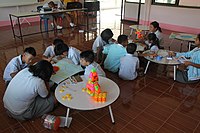
Photo from wikipedia
With increasing class sizes, teachers and facilitators alike hope for learning groups where students work together in self-contained and autonomous ways requiring reduced teacher support. Yet many instructors find the… Click to show full abstract
With increasing class sizes, teachers and facilitators alike hope for learning groups where students work together in self-contained and autonomous ways requiring reduced teacher support. Yet many instructors find the idea of developing independent learning in small groups to be elusive particularly in K-12 settings (Ertmer and Simons in Interdiscip J Probl Based Learn 1(1):5, doi:10.7771/1541-5015.1005, 2006; Simons and Klein in Inst Sci 35(1):41–72, 2007). Autonomy in small learning groups is actively promoted in many of the forms of problem-based learning (PBL). A PBL learning group is traditionally defined as students with tutor assigned to the group. However, as PBL is introduced into K-12 environments, the assumption of group autonomous functioning is tenuous for a variety of reasons. The purpose of this research is to determine the extent to which a K-12 PBL learning group functions in autonomous ways when a computer-based scaffold provides some student support normally provided by the teacher or tutor during a PBL environmental science unit. If a computer-based scaffold can successfully enable key elements of autonomous group functioning by supplying process level support normally provided by a tutor or teacher, K-12 teachers anxious to attempt PBL may be able to venture with greater confidence that they can provide multiple learning groups adequate support. Results suggest that a computer-based scaffold informed by Moore’s transactional distance theory can promote process elements of autonomous group functioning.
Journal Title: Technology, Knowledge and Learning
Year Published: 2018
Link to full text (if available)
Share on Social Media: Sign Up to like & get
recommendations!